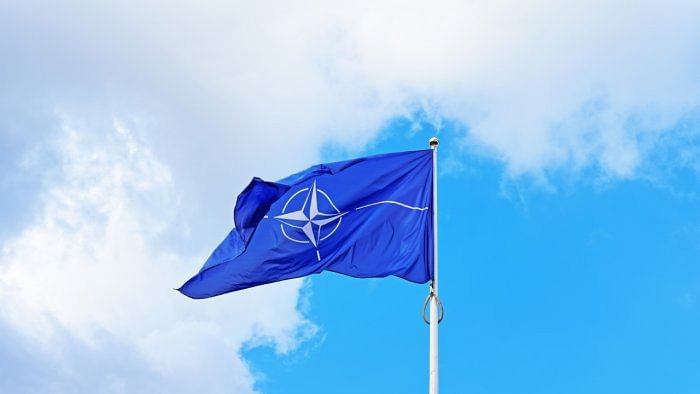
Indian lobbyists daydreaming about a military alliance with the United States are excited over the breaking news that the US House Select Committee on the Strategic Competition between the Chinese Communist Party (CCP) and the US has adopted a policy proposal to enhance the deterrence of Taiwan, which inter alia included strengthening of NATO Plus by the inclusion of India. Indeed, NATO Plus is a privileged group under the alliance umbrella comprising AUKUS members, plus Japan and South Korea.
There is no question that the House select committee is truly ‘bipartisan’. It is headed by Mike Gallagher, a staunch supporter of Donald Trump, and includes, among others, a Democrat of some standing, Raja Krishnamoorthi whom The Guardian once described as one of the ‘up-and-coming leaders of the Trump resistance in Washington’. They are joined at the hips: both are ambitious young tigers with eyes set on career graph and tapping into the swelling reservoir of Sinophobia (and Russophobia) prevalent in the US, which bring them to the ‘right side of history’ as far as the deep state and the military-industrial complex is concerned.
Bipartisan politics in the US is an enigma wrapped in mystery. When it comes to foreign policy, US democracy is literally run by the ‘Uniparty’, the distinguishing feature being the shared vision of the Democrats and Republicans, which tends to uphold the same powerful elite regardless of party affiliation. It is a reasonable assumption that a major enterprise such as the proposed legislation on the CCP would have inputs from the Biden administration directly or indirectly. Anyone familiar with Soviet-American Cold War politics would concur.
Also Read | NATO debates 'security guarantees' for Ukraine
Therefore, it is a small step away from comprehending that the breaking news on the Hill may have something to do with Prime Minister Narendra Modi’s upcoming State Visit to the US — call it kite-flying or pressure tactic (or both). More likely, it undercuts India’s newfound enthusiasm for leading the Global South at world forums, which is posing headaches for Washington.
What has India got to do with ‘deterrence of Taiwan’, an entity we don’t even recognise? Three things come into play here: one, deterrence of Taiwan is the objective correlative of containment of China, a topic where India would conceivably be a stakeholder; two, by joining squire Don Quixote to tilt at the windmills of the CCP, the lowly Sancho Panza risks burning all bridges leading to Beijing, since it is axiomatic that CCP is Xi Jinping — and vice versa.
Third, most important, Sancho Panza’s stature probably rose by being a sidekick in Don Quixote’s chivalrous quests, and he did come to occupy a canonical space in a knightly story meant for the annals of all time in the epic novel of Miguel de Cervantes. But life is real. This is important because the Biden administration is pampering India’s vanities and assuming that the Modi government gets besotted with fantasies about chivalry.
Seriously, where’s the beef in NATO Plus which has neither an Article 5 nor can be an asset for Modi’s vision of AatmaNirbhar Bharat? Perhaps, the United Kingdom’s experience as the US’ closest ally provides some clues. Considering the word limit, let me quote just a few lines from a UK House of Commons Committee report dated March with recommendations to the Rishi Sunak government:
“The UK-US relationship in defence, security and intelligence is strong and enduring. Our Armed Forces have fought alongside in many campaigns post-1945 and continue to work together on development of both equipment and doctrine. Both countries benefit from the relationship: the UK benefits from US resources and economies of scale; the US from British niche capabilities, the UK’s global reach and its willingness to defend its values. However, defence industrial co-operation is often limited as a result of US defence export controls. Any failure to consult Allies before taking action can also have negative consequences, as was demonstrated by the Afghanistan withdrawal. Nevertheless, the joint approach in response to Russian actions in February 2022 demonstrates the value of the UK-US relationship.”
The analogy is patently insufficient since the UK lives and survives as world power thanks to the US, which is not the case with India. Nonetheless, realism is needed. There is nothing like a free lunch in the US way of life and ‘interoperability’ within any NATO format will inevitably translate as living off US military hardware and dittoing US global strategy. Europe has learnt the bitter truth that nothing grows under a banyan tree. European defence remains a chimera, occasional captivating speeches by Emmanuel Macron notwithstanding.
Conceivably, the House Select Committee is a doormat for the US arms manufacturers. NATO Plus will mean sudden death for India-Russia defence cooperation. The paradox is, this move comes only a fortnight after the Indian Navy successfully test-fired the BrahMos supersonic cruise missile from its frontline stealth guided-missile destroyer INS Mormugao — that is, within 18 weeks of BrahMos air version being successfully test fired from the supersonic fighter aircraft Sukhoi 30 MK-I and within 15 weeks of India sealing a $375 million deal with the Philippines for supplying three batteries of BrahMos missile in what is by far the single most prestigious export order India’s defence industry ever secured.
There is a Chinese proverb: Charity is not a bone you throw to a dog, but a bone you share with the dog. NATO Plus is a bone. But how can Raja Krishnamoorthi or Ro Khanna (who is also in the House Select Committee) possibly ensure that the bone being thrown at their motherland is a bone that their adopted country is genuinely prepared to share — like Russia did?
(MK Bhadrakumar is a former diplomat.)
Disclaimer: The views expressed above are the author's own. They do not necessarily reflect the views of DH.